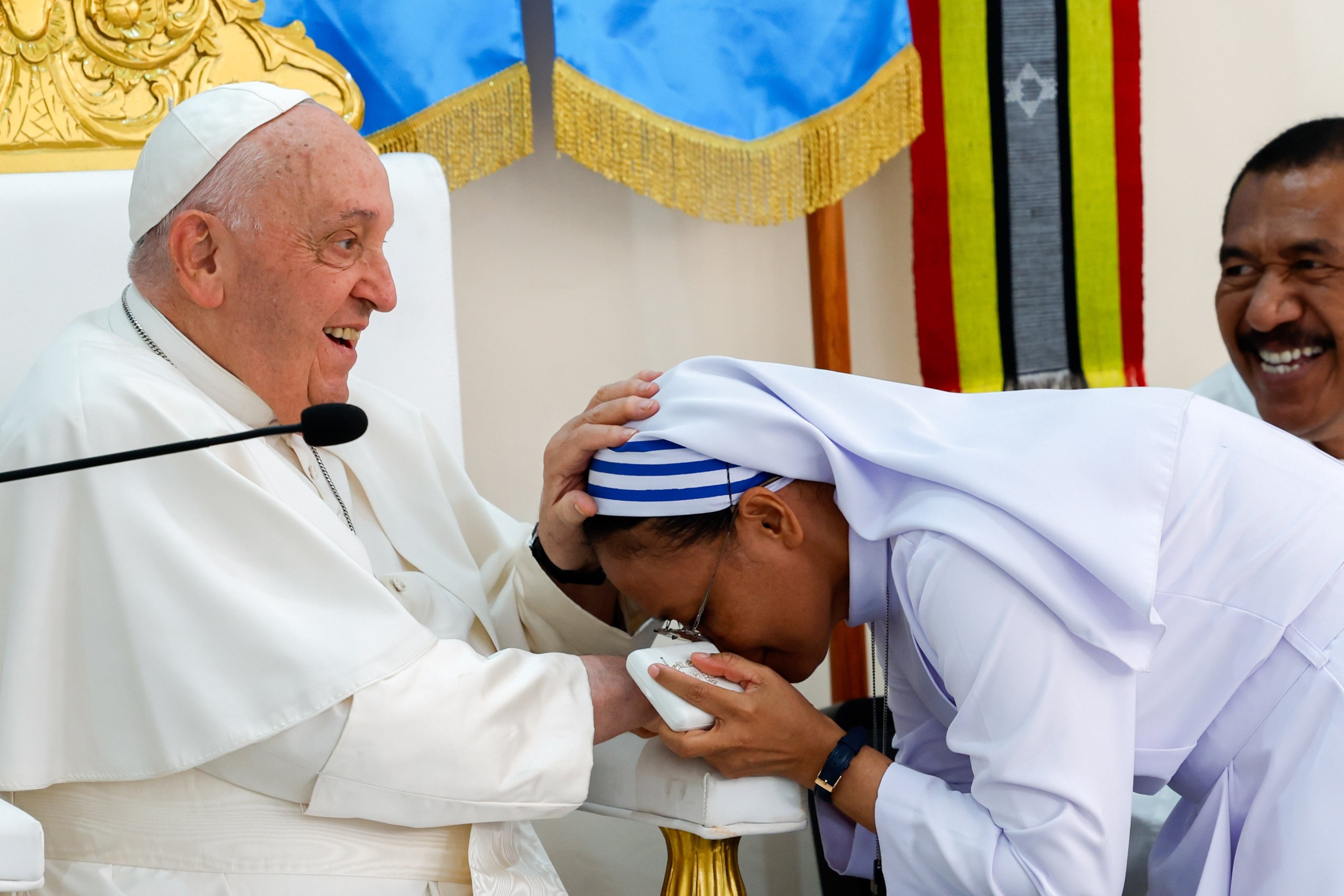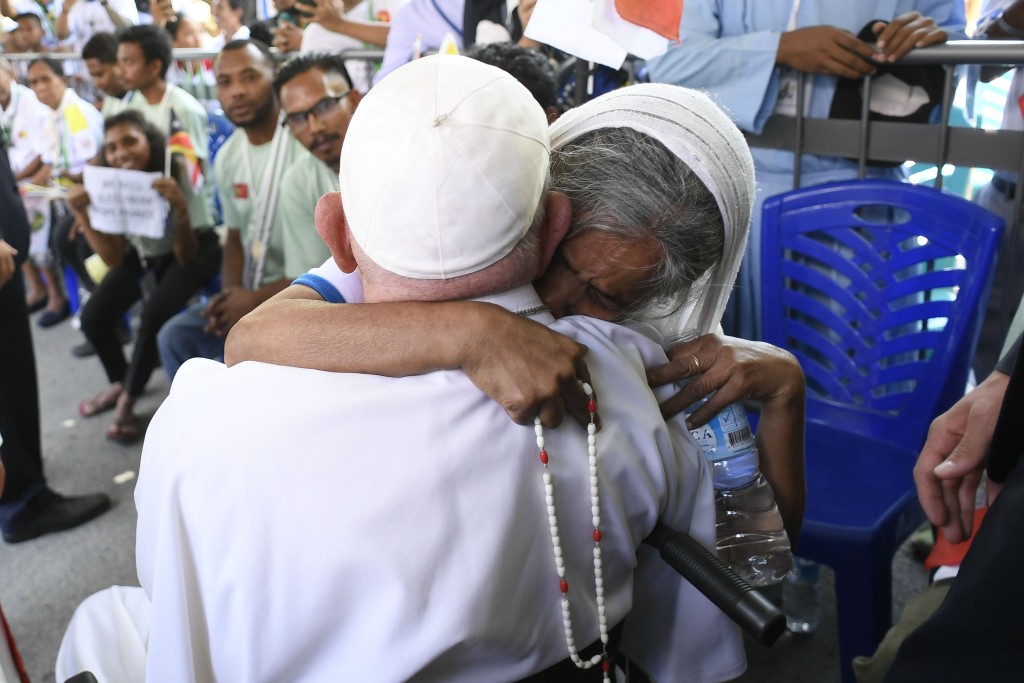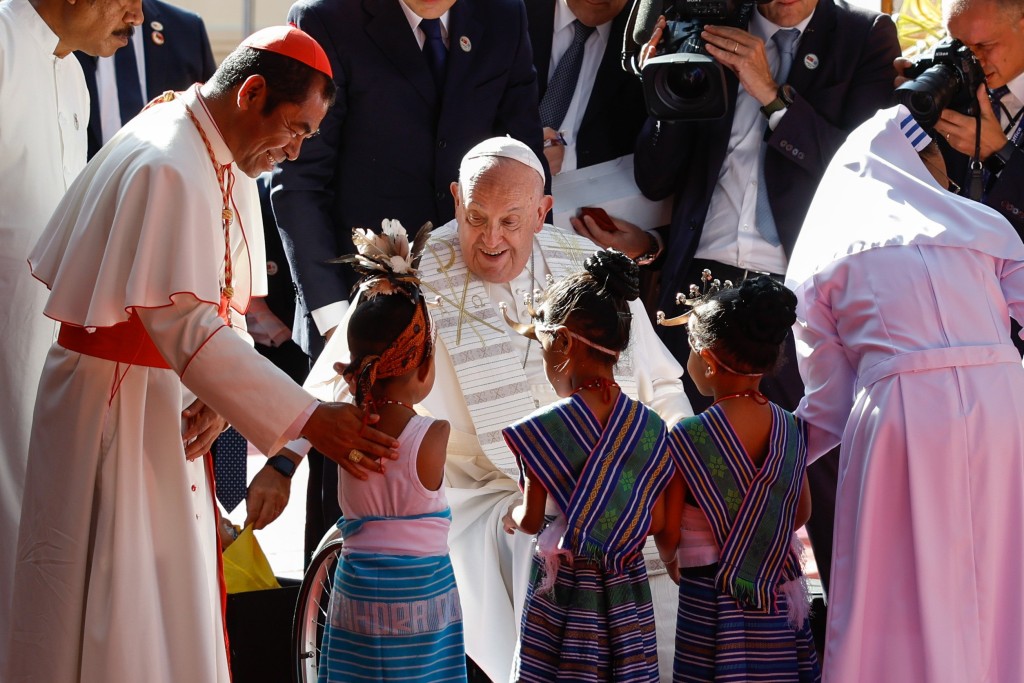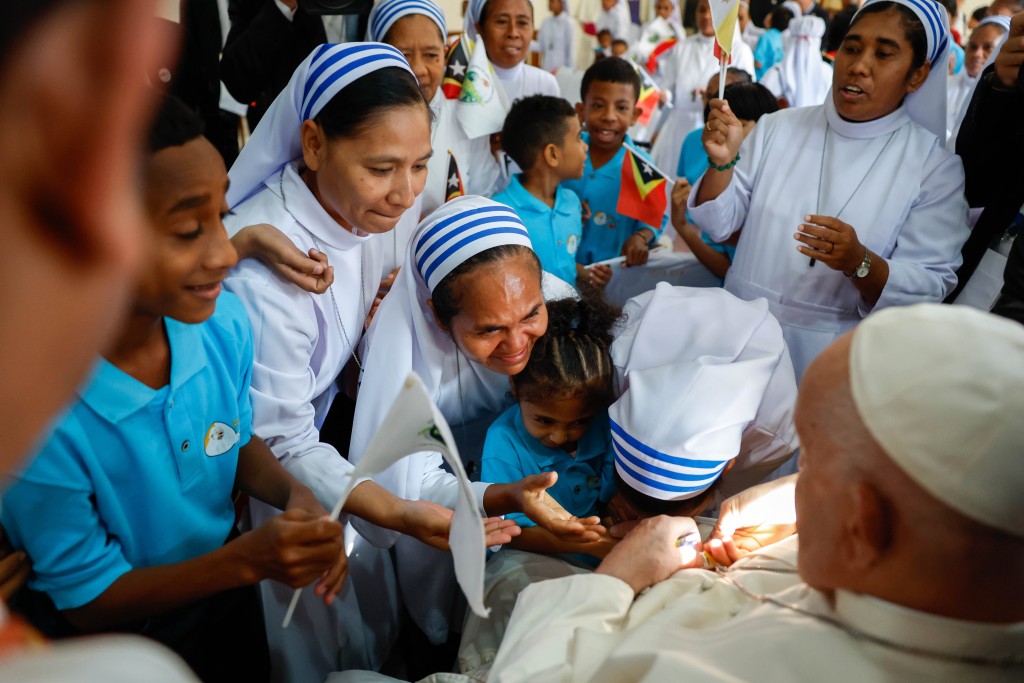
On Tuesday, Pope Francis celebrated Mass for 600,000 people in Timor-Leste. The overwhelming turnout—half of the country’s population—made this one of the largest gatherings, proportionally, in the history of papal travel.
The Mass was held at the Tasitolu Peace Park on September 10, 2024, on the same grounds where Saint John Paul II led a prayer for the Timorese people during their fight for independence from Indonesia in 1989.
The park, known for its tragic past as a site where Indonesian forces discarded the bodies of those killed during their 24-year occupation of the country, has now been transformed into the “Park of Peace.” With vibrant yellow-and-white umbrellas representing the Vatican flag, attendees shielded themselves from the afternoon sun, eagerly awaiting Pope Francis’ arrival. In a nation where nearly 98% of the 1.3 million residents are Catholic, this Mass symbolized the unshakable faith of the Timorese people.

A nun embraces Pope Francis during a meeting with bishops, priests, deacons, religious, seminarians and pastoral workers at Immaculate Conception Cathedral in Dili, Timor-Leste, Sept. 10, 2024. (CNS photo/Vatican Media)
A Homily of Hope and Renewal
Pope Francis delivered his homily in Spanish, translated into the local Tetum language, where he reflected on the birth of Christ as a symbol of new beginnings, hope, and mercy. Quoting the Prophet Isaiah, Francis reminded the faithful of God’s promise of light and redemption through the birth of a child. “God makes His saving light shine through the gift of a child,” he said, emphasizing the transformative power of faith, even in the most challenging times.
In a poignant moment, Pope Francis drew attention to Timor-Leste’s young population, highlighting the significance of its children and youth. “The presence of so much youth and so many children is a gift, an immense gift,” the Pope said, encouraging the people to care for the future generations and stay rooted in their faith. The best thing the country has, the pontiff insisted, is its people, “the smile of the children. A people that teaches children to smile, is a people with future.”
He explained that “making room for the little ones, welcoming them, caring for them, and making ourselves small before God and our brothers and sisters, are precisely the attitudes that open us to the Lord’s action”.
Francis also warned against external influences that could harm the country’s rich cultural and spiritual heritage, metaphorically referencing crocodiles—known in the region for their strength—as forces that could “bite, and bite hard.” He urged the Timorese to remain steadfast and protect their traditions, their faith, and their people.
The Pope also asked the faithful of one of the poorest countries in the world to “not be afraid to make ourselves small before God and before one another; let us not be afraid to lose our lives, to give our time, to review our programs and to resize, when necessary, our projects, not to minimize them, but to make them even better through the gift of ourselves and the acceptance of others.”

Pope Francis greets children in traditional dress during a visit with children who are seriously ill or have severe disabilities at the Irmas Alma School in Dili, Timor-Leste, Sept. 10, 2024. He is joined by Cardinal Virgílio do Carmo da Silva of Dili.(CNS photo/Lola Gomez)
God raises the helpless from the dust
Let us ask together, in this Eucharist, as men and women, as Church and as society, to know how to reflect in the world the powerful and tender light of love, of that God who, as we pray in the responsorial psalm, raises from the dust the helpless, lifts the poor from their misery, to make them sit among the nobles”, Pope Francis asked those present at a different point in his homily.
According to the journalists traveling with him, throughout the 48-hour visit to Timor-Leste, the capital city was visibly impacted by trip, with crowds flocking the streets every time the Argentine pope moved. As scheduled, Francis, 87 years old and energized by the positive welcome he received here following two successful stops in Indonesia and Papua New Guinea, began the day visiting a home ran by nuns who care for physically and mentally handicapped children. “They teach us how we should let ourselves be cared for by God and not by so many ideas, or plans or whims. They are our teachers,” he said, cuddling and holding the hand of a boy named Silvano, who is in a wheelchair. In a very touching encounter, he also caressed and played with several other children with immense tenderness, provoking shouts of surprise and joy from those who were following the visit on giant screens.
He also caressed and kissed the sick, some on stretchers, who waited for him at the exit of the Cathedral of the Immaculate Conception, where he had a meeting with bishops, priests, deacons, nuns, seminarians, and catechists. Francis thanked the work of the religious of East Timor, a country “in the confines of the world.”
“I also come from the ends of the world, but you more than me,” Francis said. “And I like to say it – precisely because it is at the edge of the world, it is at the center of the Gospel! This is a paradox that we have to learn: in the Gospel, the peripheries are the center, and a Church that has no capacity for peripheries, and that hides in the center is a very ill Church. Instead, when a Church thinks beyond, and sends out missionaries, it goes into those peripheries that are the center, the Church’s center. Thank you for being at the peripheries, for we know well that in the heart of Christ the “existential peripheries” are the center. Indeed, the Gospel is full of people, figures, and stories that are on the margins, on the borders, but are called by Jesus to become protagonists of the hope that he came to bring us.”
Pope Francis greets children and religious women during a visit with children who are seriously ill or have severe disabilities at the Irmas Alma School in Dili, Timor-Leste, Sept. 10, 2024. (CNS photo/Lola Gomez)
The Church’s Impact in Timor-Leste
Timor-Leste, one of the smallest and youngest nations in Asia, gained independence in 2002 after decades of conflict. Despite its struggles, the Catholic Church has been an anchor for the nation, playing a critical role not only in its fight for independence but in its spiritual and social development. With a population that is overwhelmingly Catholic, the Church’s influence is deeply felt throughout the country’s institutions and communities.
The Pontifical Mission Societies (TPMS) have been instrumental in supporting the local Church’s efforts. Over the past five years, TPMS has provided over $1.4 million to support various mission initiatives, from funding the three dioceses of Dili, Baucau, and Maliana, to supporting seminaries and schools. Much of this funding—more than $840,000—has gone specifically toward nurturing native vocations, providing for the education and formation of over 600 seminarians and 320 novices. This support has been critical in training future priests and leaders like Ebid Lone, a seminarian preparing for ordination, who attributes his ability to study to the help of a Spanish missionary and the Church’s mission programs.
In his homily, Pope Francis noted the importance of education in shaping Timor-Leste’s future. With 65% of the population under the age of 30, the Church has established 320 schools serving nearly 83,000 students. These institutions, funded in part by the TPMS, are a vital part of the country’s efforts to provide for its young people and ensure a better future for generations to come.
A Message for the World
As Pope Francis concluded his homily, he delivered a message not just for Timor-Leste, but for the entire global Church. He reminded the faithful that, despite the challenges the country continues to face—including poverty, emigration, and social unrest—Timor-Leste’s strength lies in its people. “Lo mejor es su pueblo” (The best thing is its people), he remarked, emphasizing the joy and hope he witnessed in the children lining the streets and the unwavering faith of the Timorese.
Francis’ message extended beyond the borders of Timor-Leste. He encouraged all to take inspiration from the Timorese example, reminding the world that peace, unity, and faith must be the foundations for any society striving to overcome adversity. With the Church’s ongoing support through initiatives like those of the Pontifical Mission Societies, the faithful in Timor-Leste will continue to thrive and serve as a beacon of hope in the region.



